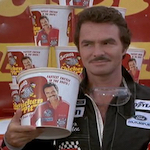 July 1, 1983
July 1, 1983
STROKER ACE is one of the many Burt Reynolds movies directed by stunt legend Hal Needham. Before this he’d been second unit director for the car chase in THE LONGEST YARD and then directed Burt in SMOKEY AND THE BANDIT, HOOPER, SMOKEY AND THE BANDIT II and THE CANNONBALL RUN. This one’s not nearly as good as Hooper, but at least not as broad as CANNONBALL.
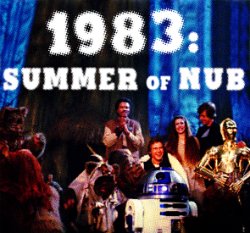 Burt (in his followup to BEST FRIENDS) stars as Stroker Ace, undisputed regional champion of smarmy womanizing, also a legendary NASCAR driver. There’s a prologue where he’s a little kid and seems to gain his love of driving fast by experiencing a police chase while getting a ride home from his friend’s dad, who’s a moonshiner. The kid they have playing young Stroker is really good, chewing gum and repeatedly checking his hair in the rear view mirror.
Burt (in his followup to BEST FRIENDS) stars as Stroker Ace, undisputed regional champion of smarmy womanizing, also a legendary NASCAR driver. There’s a prologue where he’s a little kid and seems to gain his love of driving fast by experiencing a police chase while getting a ride home from his friend’s dad, who’s a moonshiner. The kid they have playing young Stroker is really good, chewing gum and repeatedly checking his hair in the rear view mirror.
Stroker seems more interested in hitting on the various models presenting the race than anything else. He’s a guy so unfamiliar with virginity that he has to be reminded what the word is for that. The only reason he might care about winning is to show up his younger rival Aubrey James (Parker Stevenson, The Hardy Boys). He makes a point to always steal the spotlight from Aubrey, like when he arrives during the introduction to a race, skidding out on the lawn in a car missing its front left tire, his mechanic and loyal sidekick Lugs Harvey (Jim Nabors, who was also in THE BEST LITTLE WHOREHOUSE IN TEXAS) leaning out the other side to balance it.
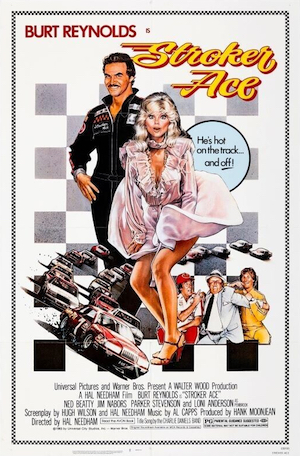 After the race he pulls a wacky prank on his sponsor (Warren Stevens, FORBIDDEN PLANET) – nothing big, just harmlessly filling his car with wet cement while he’s inside and then strutting away smirking about how awesome it was – so he needs to get a new one. He reluctantly signs a phone-book-sized, obviously very questionable contract from transparently sleazy-as-fuck fried chicken mogul Clyde Torkle (Ned Beatty, SUPERMAN I-II).
After the race he pulls a wacky prank on his sponsor (Warren Stevens, FORBIDDEN PLANET) – nothing big, just harmlessly filling his car with wet cement while he’s inside and then strutting away smirking about how awesome it was – so he needs to get a new one. He reluctantly signs a phone-book-sized, obviously very questionable contract from transparently sleazy-as-fuck fried chicken mogul Clyde Torkle (Ned Beatty, SUPERMAN I-II).
Already in Clyde’s employ are intimidating chauffeur Arnold (Bubba Smith, who had been in four episodes of the Burt-less TV series based on SEMI-TOUGH) and virgin Sunday school teacher executive assistant Pembrook Feeney (Loni Anderson, VIGILANTE FORCE). This was five years before Anderson and Reynolds were married.
It’s interesting how much this is not a racing movie. Like, there is no emphasis on needing to win a big race or anything like that. It’s mostly a laid back comedy about regretting taking a sponsorship he’s embarrassed of and trying to get out of it. I don’t really find race cars that interesting, so I was kind of relieved how much of it was about going on a promotional tour.
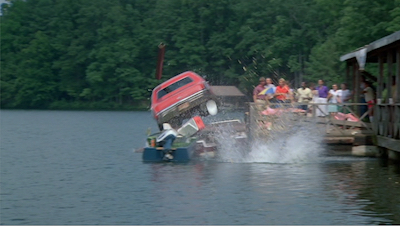 I’m sure for people who watch racing it was cool to see footage of NASCAR cars and fans on the big screen, and of course there are a whole bunch of real drivers who appear in it (some with that familiar type of cameo where most of us just think “clearly this is some guy I’m supposed to recognize”). I read that Needham and Reynolds owned a NASCAR team together, so they were into this stuff. For the rest of us I’m glad they managed to fit in a few other stunts here and there. The best is Aubrey riding a rolling cart down a hotel hallway, crashing through a window and into the swimming pool. Second best is Torkle’s limo crashing sideways through the 3rd Annual Cade County Law Enforcement Association picnic and off of a dock.
I’m sure for people who watch racing it was cool to see footage of NASCAR cars and fans on the big screen, and of course there are a whole bunch of real drivers who appear in it (some with that familiar type of cameo where most of us just think “clearly this is some guy I’m supposed to recognize”). I read that Needham and Reynolds owned a NASCAR team together, so they were into this stuff. For the rest of us I’m glad they managed to fit in a few other stunts here and there. The best is Aubrey riding a rolling cart down a hotel hallway, crashing through a window and into the swimming pool. Second best is Torkle’s limo crashing sideways through the 3rd Annual Cade County Law Enforcement Association picnic and off of a dock.
Unsurprisingly there’s also one of those comical bar brawl scenes, but it’s mostly just guys punching each other, nothing very fancy. There are some race car crashes but from the way the film quality changes I think they’re just taken from real NASCAR footage.
Stroker reunites with his childhood friend from the prologue, Doc Seegle (John Byner, THE GREAT SMOKEY ROADBLOCK) who’s now working as an actor and helps Stroker with mischievous trickery. Doc’s moonshiner dad (Frank O. Hill) is still around too. When he explains that he makes jewelry out of manure, Stroker doesn’t take any time to be surprised or confused, just quips that he’s “the Cartier of ka-ka.” I didn’t understand why they kept coming back to this joke, but it turns out it’s because Hill is not an actor, but a “humorist, sportsman and down-home philosopher” whose claim to fame was encasing quail droppings in plastic and selling them as a joke. Here he is on The Tonight Show with Johnny Carson, where he seems much more like a natural comedian than he does in the movie:
It turns out Burt ripped off that Cartier line from Johnny! Now it makes more sense.
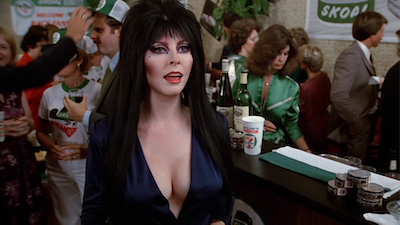 There’s also an early big screen appearance by Cassandra Peterson. She’s listed on the opening credits, so I had my eye out for her. The surprising thing is that when she shows up she has the full on Elvira makeup and wig! She just hits on Lugs and is never seen again. I guess it’s up to interpretation whether they fuck or he fends her off all night – all we hear about her is “I just spent all night having to deal with this very strange person—“ By this time Peterson had already been hosting Elvira’s Movie Macabre for a year or two, so we can assume that’s who she’s playing, but there’s nothing in the dialogue or credits to verify it.
There’s also an early big screen appearance by Cassandra Peterson. She’s listed on the opening credits, so I had my eye out for her. The surprising thing is that when she shows up she has the full on Elvira makeup and wig! She just hits on Lugs and is never seen again. I guess it’s up to interpretation whether they fuck or he fends her off all night – all we hear about her is “I just spent all night having to deal with this very strange person—“ By this time Peterson had already been hosting Elvira’s Movie Macabre for a year or two, so we can assume that’s who she’s playing, but there’s nothing in the dialogue or credits to verify it.
STROKER ACE is a very good example of the movies from a previous era (often the ’80s) where things that are now considered sexual harassment or worse are played as rascally flirtation and guys being guys. Stroker does lots of answering the door of his hotel room in a towel, like Harvey Weinstein, purposely leaning in too close to Pembrook, trying to get her to share a hotel room with him on tour, pretending to forget that she doesn’t drink, lying that his champagne is non-alcoholic and getting her drunk. The first time he gets interrupted by Lugs, but the second time she realizes she’s drunk but seems to think it’s charming that he did that, and tells him “I want you. And right now.”
This is the most problematic™ scene because she immediately passes out on the bed, which kicks off a long comical interlude where he keeps almost leaving but then coming back and making excuses for why she would want him to take off more articles of her clothing. The scene ends with him saying, “I mean, I could just ravage you anyway. Who would know?,” then looking at her, and then at the camera and raising his eyebrows like, “Why not?”
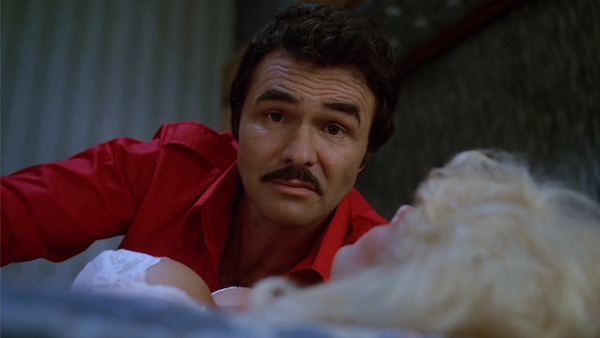
Or at least that’s how I took it. The next morning she asks him if anything happened and he says “You mean you wouldn’t know?,” which might mean he’s disappointed to realize he could’ve gotten away with it? I’m not sure. Either way she’s giving him way too much credit when she says, “You are so sweet, that you could have and you didn’t.” Then she cries about what a wonderful man he is.
Torkle actually does some of the same things to her, and it’s played as funny but sleazy, instead of funny and cute. He tries to jump on her on his hotel bed, but she escapes, and he fires her. He seems to recognize that what he did was an attempted rape, since he worries about her telling Stroker, but all she says about it is, “He just made me mad, so I kicked him in the scrotum.”
The movie is based on the 1973 book Stand On It by Bill Neely and Bob Ottum. It was originally purchased in 1977 as a vehicle for Paul Newman, with a script by Mort Sahl. I assume that would’ve been pretty different. The book is written as an autobiography of the fictional driver, but was inspired by Neely’s own experiences as an auto racer and manager of racing public relations for Goodyear Tires. Wikipedia claims “He also starred in I KNOW WHAT YOU DID LAST SUMMER, Matlock, and THE NIGHT FLIER,” but sadly IMDb disagrees that that’s the same William Neely.
Needham wrote the script with Hugh Wilson, a sitcom writer and director (WKRP in Cincinnati) who would write and direct POLICE ACADEMY the following year, bringing Bubba Smith with him. If you think about it, Stroker is kind of a predecessor to Steve Guttenberg as Mahoney, the charming horny prick who can get away with anything because of his smile. And encasing his authority figure in cement is very Mahoney-esque. Wilson’s later movies include GUARDING TESS, THE FIRST WIVES CLUB and DUDLEY DO-RIGHT.
STROKER ACE has a descriptive theme song by the Charlie Daniels Band, and a SMOKEY AND THE BANDITesque score by Al Capps (SHARKY’S MACHINE). Interestingly, Ry Cooder (SOUTHERN COMFORT) was originally hired as composer, and he made a rockabilly score, but Needham hated it and fired him. The following year Walter Hill was unhappy with a score someone made for STREETS OF FIRE and had heard Cooder’s rejected STROKER ACE music and liked it, so they recycled some of that. I assume it was re-recorded but in its finished form it’s certainly much cooler than STROKER ACE. Would’ve been interesting to see if it made it seem better.
STROKER ACE got poor reviews and was also a flop, opening #8 at the box office, despite nothing else new coming out that week. A 1987 LA Times article about Reynolds trying to stage a career comeback describes him looking over a printout of his filmography, pointing at STROKER ACE and saying, “That’s where I lost them.” He laments that he turned down James L. Brooks’ TERMS OF ENDEARMENT because, “I felt I owed Hal more than I did Jim.” TERMS ended up being the second biggest grosser of 1983, was nominated for 11 Oscars and won 5, including best picture and best supporting actor for Jack Nicholson in the role written for Reynolds. Meanwhile, STROKER ACE was nominated for Razzies for worst picture, worst director, worst actress, and worst new star, and Nabors won worst supporting actor. Because he did such a bad job, I guess.
Oh well. You win some, you lose some, or sometimes you get out of a fried chicken sponsorship. By the way, it would be cool if for the 40th anniversary of the movie Hasbro made a Clyde Torkle’s Chicken Pit Racing Edition Optimus Prime. I’ll keep an eye out.
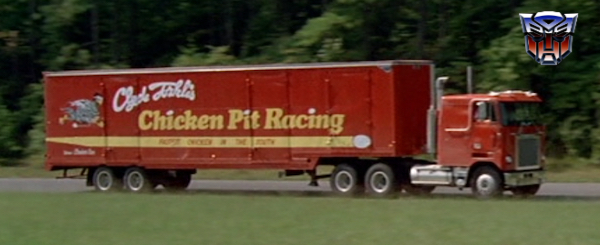
P.S. The movie poster (painted by Drew Struzan) has grey and white racing checkers as the background, a motif that was carried over for the collaged VHS art, and later reused for the DVD. But it kinda amuses me that now the latter looks like they screengrabbed a Photoshop file with a transparent background layer.
The post Stroker Ace first appeared on VERN'S REVIEWS on the FILMS of CINEMA.
